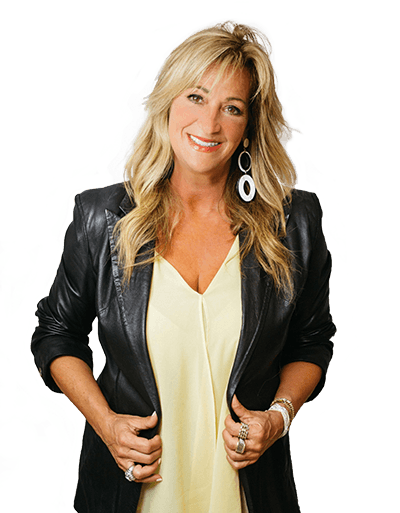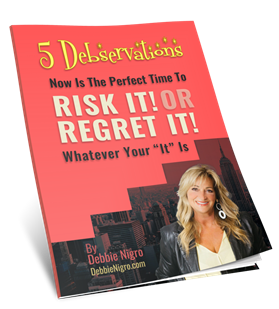TJ Hills, the renowned author of “Sex, Drugs, Babies and Breast Cancer’, walked up to me to introduce herself at a women’s book event I attended and in the nicest of ways made me listen to what she had to say. She had a very powerful message she wanted me to know about and one that I felt compelled to help her share.
I invited her to join me in the studio for a lively and very enlightening conversation to delve into the pivotal topic of estrogen, genetic testing, and its profound impact on women’s health.
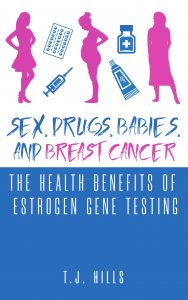
She’s passionate about educating women about estrogen exposures and genetic nutritional tools in cancer prevention. Her message is universal as cancer touches the lives of many. Her message is loud and clear on her website BetterEstrogen.com.
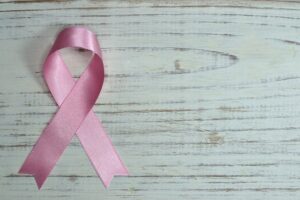
Sharing Wisdom from Her Own Personal Experiences
T.J. Hills was a busy working mother of 3 young boys in 2009 when she was diagnosed with an aggressive Stage III breast cancer.
Like over 80% of breast cancer patients, she was the first person in her extended family to be diagnosed. She later learned that while there was no family history of cancer there was extensive medical conditions resulting from less than perfect estrogen metabolism; conditions such as endometriosis, fibroid tumors, infertility and ovarian cysts.
She took a simple gene test and learned how to improve her estrogen health with easy steps including common nutritional supplements like fish oil and Vitamin C and ones less widely known like DIM.
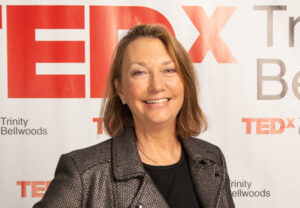
In our conversation about being fellow breast cancer survivors, TJ shared her personal journey from a bustling Wall Street career to confronting breast cancer, highlighting the tendency to prioritize everything over personal health. Something we both know women in general typically do!
But TJ stressed the need for women to cut the nonsense and prioritize their own health over ‘other things to do first’, as neglecting it can have profound consequences.
Her Insights on Estrogen and Genetic Testing
TJ Hlls has become consumed with her mission to share her knowledge about the significance of understanding estrogen metabolism genes and their impact on women’s health decisions.
She explained the essence of genetic testing, which focuses on how the body processes estrogen rather than simply measuring estrogen levels.
Having this knowledge she says, has everything to do with very practical scenarios, like decisions women make about birth control pills or bioidentical hormones which are influenced by genetic predispositions.
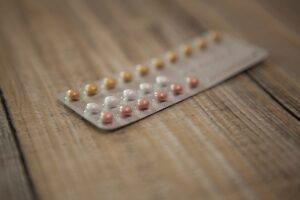
Founder, Better Estrogen Health Foundation
TJ’s Foundation offers free estrogen nutrition toolkits and nutritional consultations, aiming at empowering women to make informed decisions about their health.
With advancements in technology and artificial intelligence, access to genetic information for disease prevention is becoming more feasible.
TJ is urging women to take proactive measures and so they can make informed choices.
Through education, awareness, and accessible resources, she says, the journey towards healthier living becomes not only feasible but imperative.
T.J. Hills is a Founding Board Member of the Better Estrogen Foundation whose mission is to save lives by educating women about estrogen exposures and how genetic nutritional tools may prevent cancer. In breast cancer remission since 2009,T.J. Is the Former CEO and Board Member of the Estrogen Gene Test Co and Hormonal Cancer Foundation. She spent 35 years on Wall Street advising Institutional Investors about research and data. She is a powerful speaker who has appeared on National TV, radio and print outlets across the country and spoken at major medical and corporate conferences as well as large and small women’s groups inspiring women and their physicians to take control of their health starting with a simple estrogen gene test.
Meet TJ Hills and get educated in this podcast of our live conversation on The Debbie Nigro Show. If you’d rather read than listen the transcript is below.
AUDIO TRANSCRIPT:
0:00:00
Hi everybody, I’m Debbie Nigro. I like to get your attention for important information by having some fun, bonding a little bit and then going, you got to know this stuff. So today I invited to join me, and she’s in the studio today, which is kind of nice, TJ Hills. She’s the author of the bestselling book, Sex, Drugs, Babies and Breast Cancer.
1
0:00:22
Wait, is it drugs? Is it drugs? Drugs! Right, there’s more than one drug. Health benefits of estrogen gene testing and a founding board member of the Better Estrogen Foundation.
1
0:00:33
Now, it may not appeal to everybody in the audience, but you have to listen, because we’re trying to save lives here. And there is not a person in the audience who doesn’t have somebody who’s, they know, who’s been touched by cancer, okay? Whatever the heck kind it is. And apparently, and I’ve become aware of having met TJ in person when she randomly approached me at an event we were both attending and
1
0:00:52
I was like, hey, apparently educating women about estrogen exposures and how genetic nutritional tools work can actually help prevent cancer. So hello TJ Hills. Hello Debbie. Wait, hold on, we need a microphone. Bob goes, oh I see.
1
0:01:12
Hello TJ Hills.
2
0:01:14
Hello Debbie.
1
0:01:15
Thank you for having me. So, yeah, it’s usually me who walks up and introduces myself to someone. You came right up to me after we met at the book event that was Women and the Power of the Written Word, and you had your book in your hand. I was like, okay, okay, I love her. Well, you’ve got to forgive me because I had no idea how famous you were,
1
0:01:32
and I came to give you my advice because I also had struggled so much with this issue of confidentiality. It’s a real struggle. Like, how do I say this and use my own name and use real people? And it’s a struggle. So she is referring to me getting up in front of the women, because afterwards I had a Q&A and me trying to understand how I might write my story that has still not written about
1
0:01:58
my entrepreneurial journey without naming names. Naming names and that’s she had the same thing because she had a big career on Wall Street, correct? Yes, okay, Wall Street mom of three Breast cancer breast cancer. Okay, so that changed things 2009 explain
2
0:02:14
So I was on the surface, you know super successful, New York City Taipei real Stereotypical I got three kids. I got a husband who’s never home. I had a business employing like 12 people. I was busier than busy could be and I was ignoring my health
1
0:02:35
Well, everybody else comes first when you’re the type a personality typically female It seems like you got a handle it for everybody else and you’re like Oh on your list of things to do is your thing you keep pushing it to tomorrow I just keep it way down the list of priorities.
2
0:02:51
That’s weird.
1
0:02:52
Way down the list of priorities. And you know, one of the things I learned is that, you know, you’ve got to keep it center in front because, you know, no young children need a dead mother. There you go. That doesn’t work out so good. When you could have solved it in advance.
1
0:03:09
You said like over 80% of breast cancer patients, of which, you know, I have been one, you were the first person in your extended family to be diagnosed. Now, that wasn’t true for me, but it was true for you. Nobody ever had cancer in your family? Not then. Not then.
1
0:03:24
Not then. No family history. Right. But you said people have family history of other things that could be clues to what might be coming to help make some decisions. I mean, other things in the family like endometriosis or tumors or ovarian cysts and you know different kinds of
1
0:03:40
conditions that could be a tip-off if you knew about your own body better of what decisions you should make about sex drugs and babies so that’s an interesting title of a book and how does it all come around and relate well you know I write about estrogen all the time because estrogen and estrogen-based medications like birth control pills, fertility treatments, hormone replacement, bioidentical hormones, hormone balancing. All of these things are all basically estrogen drugs. And it’s the only substance where women are making these choices, or even our mothers are
1
0:04:17
making these choices, our entire lives. Because as you said earlier, menopause. There’s no other word. We don’t say post-menopause. You’re in menopause for your entire age. Oh, I didn’t know this. No wonder I’m still hot.
2
0:04:35
It’s like an entire life stage. It’s actually the longest life stage.
1
0:04:40
You know, yesterday I’m driving around. We had our first hot day in a long time. My AC must have lost Freon along the way. And I’m dying. The windows open, the hood open up, and I go, this is not going to work. I literally couldn’t function. I can’t be that hot. And I’m used to being hot. But yeah, just what does it do to you when you can’t think straight and this is all going
1
0:05:01
on? Like, you know, it’s just besides what you know about estrogen, it’s a difficult phase of life for women on so many levels. You can’t really think straight.
2
0:05:12
I went through a menopause, chemical menopause, really young, right, from chemotherapy, and that was 14 and a half years ago, and I still have hot flashes. Like that, literally, like if you go to a doctor and you tell him that, they, they, him, her, they’re like, no, that can’t be. But it is. And I know tons of people who are saying what you’re saying all the time. And for breast cancer or survivors like yourself, there’s not a lot medical, you can’t address it.
1
0:05:41
Okay, so your point of wanting to tell everybody this loud message is what? If you can in advance. If you knew in advance, so like basically I want every woman in the world as early and young as possible to figure out what their estrogen metabolism genes are so that they can make good decisions about their reproductive health for their entire lives. Okay, I’m curious.
1
0:06:10
Okay, so you have a test, or there is a test now that didn’t exist. Not me, but yeah. That didn’t exist, that you could figure out your estrogen level? Is that what you’re saying? No, and that’s really the key word. Level is not what this is about.
1
0:06:22
metabolic genes and how you are able, genetically, to process estrogen. Which basically means how it comes out of your body in your urine. That’s what that means. Levels, the reason why it’s so important is because your levels are all over the place. Especially until you’re way past menopause.
2
0:06:42
They’re all over the place.
1
0:06:44
Okay, so I want to try and make this simple because it’s a difficult topic to comprehend. You’re the first person to bring this up in my life. A young person deciding they’re going to go on birth control pills or a woman deciding she’s going to take, you know, bioidentical hormones. These decisions are completely affected on how they will be affected physically by the nature of how much the estrogen DNA is in their body.
1
0:07:10
I’m trying to get this straight. So let’s say, for sake of the argument. There’s ten. This is not true, but let’s just say there’s ten genes right and if you have mutations on these particular ten genes right that means that The extra estrogen is not coming out of your body in the best way Which means that part of it can recirculate in your body and potentially become toxic and cancerous well That’s the worst-case scenario. There’s a whole lot of other issues where this
1
0:07:39
dysfunction is implicated, like you were saying earlier. Okay, so you take this genetic test. Yeah. And now, based on what it says, might somebody not take birth control pills because of X? Birth control pills are a special case because birth control pills are way, way, way weaker than they were when you and I, theoretically, I’m commiserating here, were dealing with this. Right? That’s not fair. Weaker is not good. No, weaker is great because what they… A weaker is good? Yeah, because… Still effective though, not weaker.
1
0:08:13
Yes, so what they found out is that you only needed like a tiny percentage of what you and I used to take, theoretically. Well, what I used to take. No fair. And so, you know, back then… You got blasted with too much stuff. The exposures were way too high. Now it’s much… there’s a whole lot of other issues with birth control drugs, but that one… but bioidentical hormones is a whole other case. Okay, I want to go to you personally because you were passionately
1
0:08:40
decided to write this because of what happened to you. You said if you knew about your estrogen function from a simple gene test, you might have made different choices. Now you are a breast cancer person in remission. Your mom, what would you have done differently?
2
0:08:57
So many choices.
1
0:08:58
Can you give somebody a reason why they should buy your, get your book, come talk to you? What would you have done different that may have helped you avoid getting breast cancer? So for example, you know, I, well, if I could go all the way back to the beginning, I would have made different choices about when I decided to have children or not. Age? Yeah, what age I decided to have children.
1
0:09:23
That matters? Yeah, because what if you need fertility drugs? How hard is it going to be to have a baby at 45 versus 25? Those are the kinds of things. If you know in advance that you’re not a great candidate for 12 rounds of fertility treatments. That’s going to inform your decisions.
1
0:09:43
Got it. Okay. So you have a foundation and it has two programs. There’s a free estrogen nutrition toolkit with informational genetic testing and you offer nutritional consults to women living with cancer and also those at high risk and educational programs and videos to teach all women how to improve
1
0:10:03
their estrogen health using the estrogen nutrition toolkit. Can you give me a synopsis of what might be in there?
2
0:10:10
Yeah, so there’s medical testing for all this.
1
0:10:12
So you can find a doctor who knows about this and you can do it that way, but they’re far between. Is that covered by insurance? No. Of course not. No, nothing is.
1
0:10:22
So basically over the many years that I’ve been preaching this, you know, they’ve developed a whole bunch of services that you can take your informational genes by that it’s like AncestryDNA, MyHeritage, or 23andMe, actually won’t allow you to do a download anymore, but they used to. You take these informational tests, you download the raw data, and that data gets uploaded in research services which can interpret your raw data. Well, this is big and coming.
1
0:10:48
I’ve been reading a lot about how artificial intelligence is going to speed this up. Yeah. And I’m certain that what you are one of few people talking about, I don’t think that many people are talking about this. No, that’s why I do it. I mean, I read a lot, so I don’t, you know, you’re my first hit on estrogen testing with the gene test here. allow people to
1
0:11:07
access Information from their DNA that will prevent a lot of diseases not just breast cancer that have been hereditary and couldn’t be avoided I think it’s amazing and it’s a it’s a shame that Generations before us didn’t have access to this kind of information Yeah, I mean, you know what we’re looking at is metabolic genes Not breast cancer genes because the thing is is that most people with cancer don’t have any cancer genes
1
0:11:29
This is you know and cancer is basically become, for most of us, an environmental disease. Yeah. Right? Yeah. I mean, so I was the first person, but my mother and my father wound up dying from estrogen cancers and that was tragic. And again, still the three of us in many, many generations of family are the only ones. Yeah, it’s exposure. Yeah, it’s exposures. Well, you know what makes me, what really solidifies that for me is if you remember
1
0:12:06
the story about the women in Long Island who lived near the…
2
0:12:09
Yes, yes, very famous, very great.
1
0:12:11
Let me get the word out of my mouth, who lived near the, what was it, the garbage dump. Yeah. You know, with the methane gas and all that stuff. So yeah, there were other things implicated in there like laundry detergent. Oh, that’s interesting. I have a group of college girlfriends.
1
0:12:32
We are maybe six who have stayed close all these years. You know, people have these little pockets of friendship they take on. And it’s kind of interesting to all of us that we, three of us, had breast cancer of our six, and one had bladder cancer and she’s passed. Three of us are breast cancer survivors and the other two didn’t have any cancer but if you close to five we were all living together like was there something going on there you know where we all went to
1
0:13:00
college who knows what we were exposed to. Right well you know in addition to the drugs right there’s all the environmental exposures because in America we’re constantly exposed to chemicals which wind up mimicking estrogen in our bodies and that’s why I’m constantly talking about this, because I’ve been doing this for a while, and sometimes you have breast cancer survivors who come,
1
0:13:23
and they don’t have a lot of mutations, but they have a few. But they’ve somewhere down the line been exposed to all kinds of stuff. Maybe they didn’t even take any medications, but they’ve been exposed.
2
0:13:33
Maybe they grew up near an environmental site.
1
0:13:37
So you’re basically saying, and we’re going to wrap this up because there’s more, you know, we’ll stay in touch, but the nutrition is a big part of it. And you have a lot to share about that in the nutrition toolkit. And you have a lot to give and help with people who, in terms of consulting, who are living with cancer and women at high risk. And I know you’re out there, you’re a famous TED speaker, and people hire you to do really heavy duty, exciting and energetic, emotional and educational speeches on this topic. So
1
0:14:05
what is your website so people can find you? Website is betterestrogen.org Okay. This is TJ Hills, author of the best-selling book Sex, Drug, Babies and Breast Cancer, Health Benefits of Estrogen Gene Testing and I think you should just check it out. Anybody who’s got a female body would benefit from reading what TJ Hills is spending all her time doing ever since she was a young mom, you know, diagnosed with breast cancer. You’re a great woman. Keep going.
1
0:14:31
You’re a great woman. Keep going.
2
0:14:33
Thanks, Debbie. It’s an honor.
Transcribed with Cockatoo

